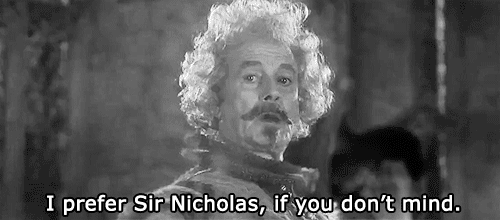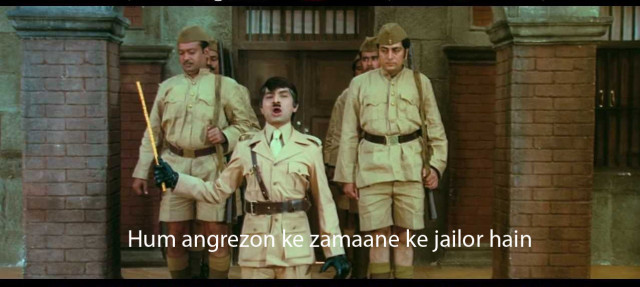Imagine you are strolling on the road and happen to find a 10 rupee note lying ahead. You look around but find no claimers and hence pick it up to tuck it in your back pocket. Just then, right at that nanosecond you find your hand holding the note being clasped by handcuffs from behind. You turn around to see what just happened and are baffled to witness an army of ghostly whispy figures of 19th century English policemen on horses and all that paraphernalia, like a thousand Sir Nicholas from the Harry Potter series appear out of thin air in front of you. You can assume some of them to be headless too if you so desire. The chief, ‘his majesty’ glides forward towards you to say “Thou art under arrest for unpatriotic behaviour towards the government. Hand over the treasure in thy hand to us right away or thou shalt be punisht.” Baffled, all that you manage to mumble is “But dude this is 10 bucks!”

Weird right? Actually its not. This situation is very much a plausible one except that instead of the ghostly Nicks you’ll have our very own 21st century khaki-men arresting you. Why, you ask? Because of The Indian Treasure Trove Act, 1878 of the Indian law which states that any ‘treasure’ found by any citizen shall be handed to the government.

This and many such old and obsolete laws, some of which as old as the grandfathers of our great-grandfathers continue to reign the Indian lawbooks, which are totally absurd in context of present social scenario. Most of these laws are unknowingly broken equally by illiterates as well as the highly educated ones as nobody knows or can imagine that such weird laws actually exist!

Jurist KTS Tulsi once was quoted as saying,”We are trying to run a judicial system in a supersonic age with bullock-cart technology”. This is exactly why the newly appointed PM Mr Narendra Modi by setting up a committee in August last year, has taken on the onus to repeal these bizarre and irrelevant laws.
We bring to you some of the weird (and funny, from a 21st century person’s point of view) laws that need Mr Modi’s attention:
1. Kite-Fliers Beware:
Remember our sweet golden days of childhood when we spent hours sweating it out on the terrace contesting in kite-flying battles, armed with our spinners, manjha and a hoard of colorful kites with the perfect kanni? How we chased every kite in the sky and shouted with glee every time we cut the opponent’s kite. And yes, how we ran vehemently after the cut kite to possess the loot of our victory! Floating in the soft clouds of nostalgia already?

Now what if I told you that you committed a criminal act every time you engaged in all that innocent frolicking? No, I am not the one being crazy!
Its The Aircraft Act of 1934 that forbids you to make, possess, sell or fly a kite. This Act defines aircraft as ‘any machine which can derive support in the atmosphere from reaction of the air and includes balloons, whether fixed or free, airships, kites, gliders and flying machine’.
Wouldn’t this imply that mass anti-govt crime is committed every year during the internationally renowned Kite Festival in Gujarat? Gujarat, did you say? Modi? Breaking laws- repealing laws? Ironic much.

2. Toothfairy’s Favourite:
If you aspire to be a motor vehicles inspector in Andhra Pradesh make sure you brush your teeth white and flashy or you might be disqualified. Yes, unclean teeth apart from pigeon chest, knock knees, flat foot, hammer toes and fractured limbs can disqualify you, no matter how qualified you are academically, says the Indian Motor Vehicles Act, 1914.

3. Muft Muft Muft! :
The one Act we can give the title of ‘a blessing in disguise’ is the Indian Serais Act, 1887, that gives us the right to walk into any hotel from a roadside inn to the outrageously posh ones, to drink water and use toilets for free, at any time not only for ourselves but our pets or any animal for that matter.

In fact a fine of Rs 20 can be imposed on the person who refuses to follow the demand. I can guarantee you had no inkling about this Act and hope you are glad you came upon this article!
4. For the Delhi Machos:
According to a law issued by the East Punjab Agricultural Pests, Diseases and Noxious Weeds Act, 1949, being a delhi-ite entitles you to be available at the beck and call of the government to beat drums on the streets if and when there’s an attack of locusts on the city.

In case of not following the law you may be charged with a fine of Rs. 50 or could be jailed for at least 10 days. Just imagine sadda dilli ke gym-shym wale munde with nagadas on the streets! The image could have been a sexy one if only they were not being chased by locusts.

5. The Moral Police Favourite:
Section 294(a) of the Indian Penal Code, 1860 states that whoever, to the annoyance of others engages in obscene acts in public place is liable to jail or fine or both. It, however does not define “obscene act” or “annoyance”. This ambiguous nature of the law is a cause of great nuisance to young couples who are harassed on a daily basis for gestures as simple as holding hands. This law wears the crown during the valentine week. For you know in our mahaan Bharat, pissing is allowed in open but kissing! Ashleel!

6. Because 11 couples= revolutionary? :
According to the Licensing and Controlling Places of Amusement (other than Cinemas),1960, it is illegal for more than 10 couples to dance together on the same dance floor. The law goes on to state that ‘if there is any crowding, the same must be reduced.’ So next time you see someone dragging people off the dance floor, remember, it could be part of the fight against crime!

7. Now This One Can Be a Problem! :
The Indian Treasure Trove Act, 1878 says “If any body finds any object belonging to treasure trove (like money, utensils etc.) of worth more than Rs 10/- under his house or in the land it should be handed back to the Government.”

But the seas don’t count right? Doesn’t suddenly being a pirate sound so much fun, aye captain?

8. Colonial Hangover:
The Bengal Bonded Warehouse Association Act, 1838. One of the most archaic acts to still inhabit our law-books, this 176-year-old law is all about acquiring and keeping the East India Company’s control over traders and property-holders that can sell their property only to the EIC. This is one law we can truly say is angrezoin ke zamaane ka.

9. Unmarried Moms? Taboo! Unmarried dads? Legal! :
According to the Indian Majority Act, 1875, a man can not get married before he turns 21. But he can become a father at the age of 18. Shocked? Yes, this law considers an 18 year old man mature enough to adopt a child but not get married, or for that matter drink. A pretty ‘mature’ law, shall we say?

10. The Matriarchal Law:
Indian Penal Code of 1860, Section 497: According to this matriarchal law, married women can have extra marital affairs without any fear of the law. Legal action however can be taken against men and that too if they are having extra marital affairs with married women only. It is legal for men to have affairs with unmarried women. So make sure your secretary is unmarried before you take her on a business meeting-cum-dinner date next time.

The above are just some of the laws that need to be abolished with immediate effect to make space for more efficient and proactive ones. We hope in the 5 year service of Mr Modi as the Prime Minister, the estimated 1382 outdated Acts identified by the newly-constituted Committee be repealed, as has recently been the section 309 of the Indian Penal Code, leading to the decriminalization of suicide. A thorough and lucid examination of these laws in context with present social, political and economic scenario shall help yield a substantial impact.
By- Aakanksha Kumari



































